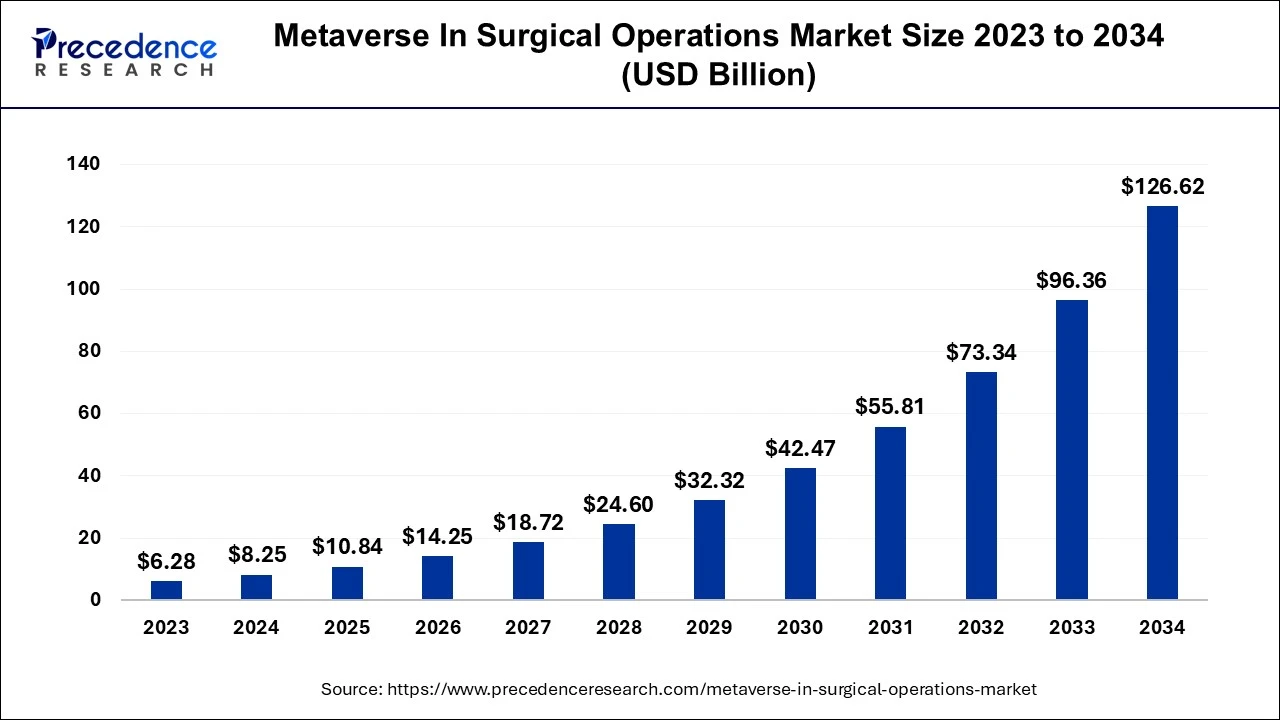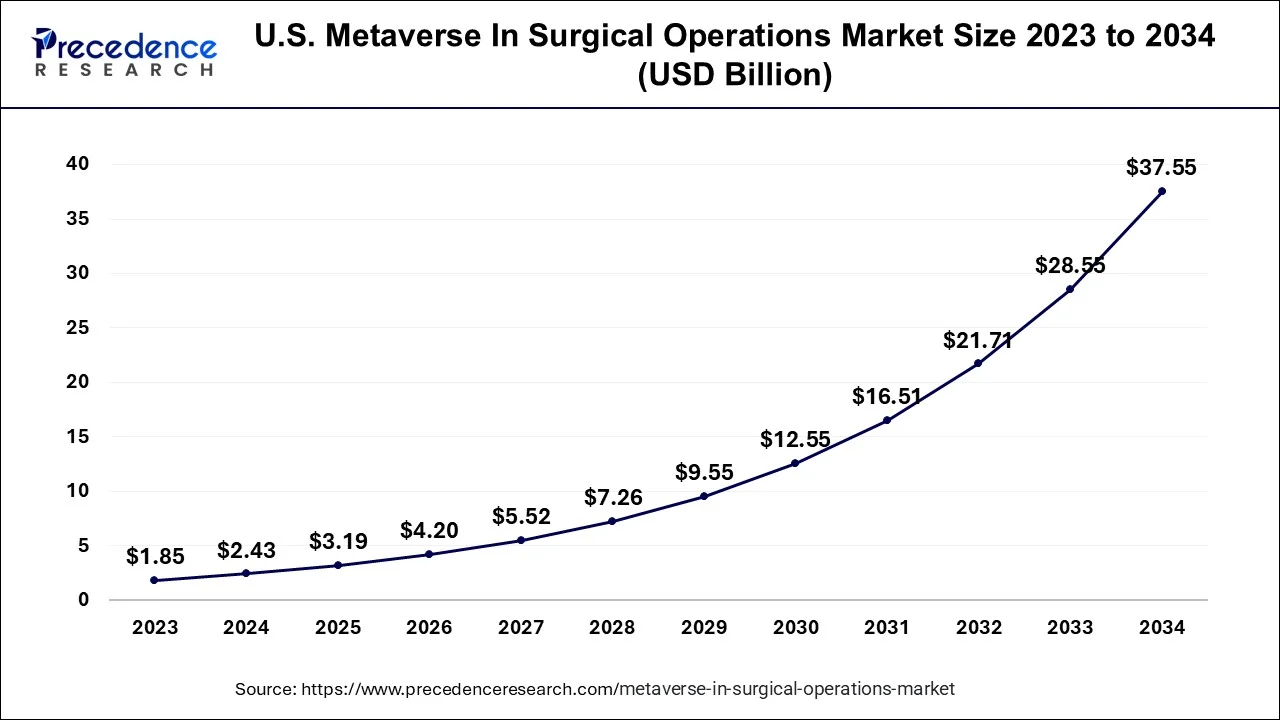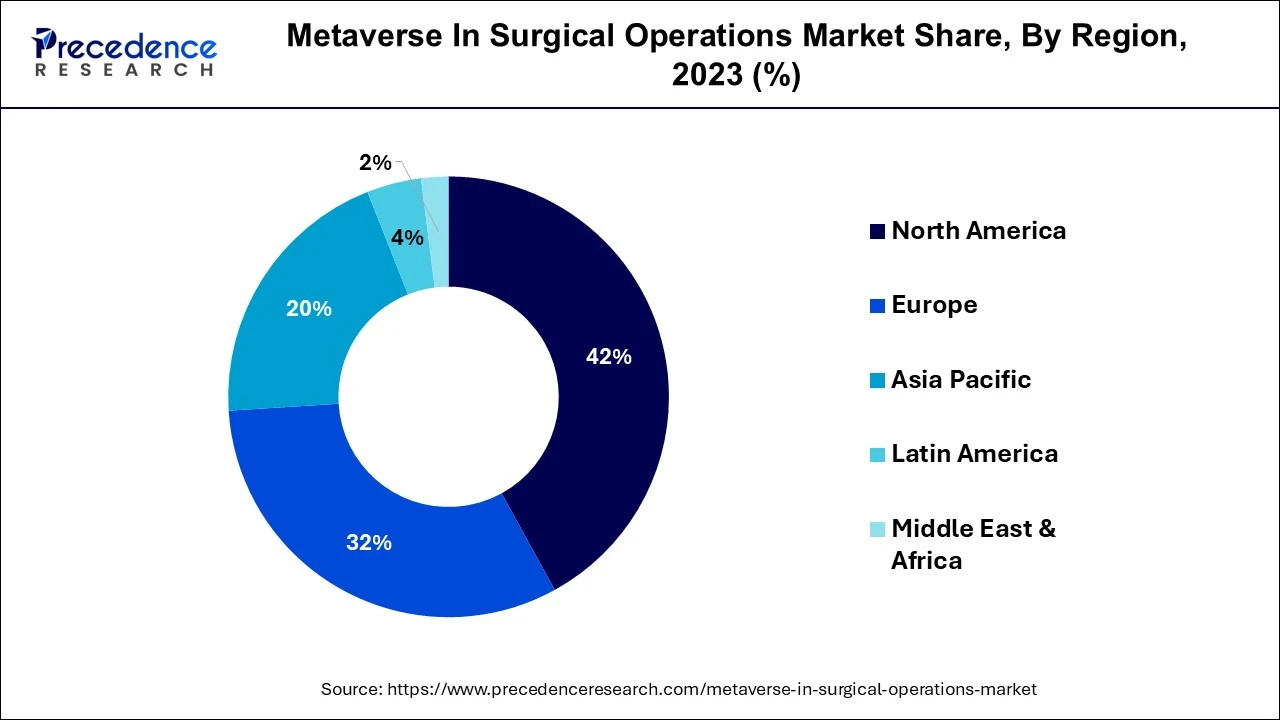December 2024
The global metaverse in surgical operations market size is calculated at USD 8.25 billion in 2024, grew to USD 10.84 billion in 2025 and is predicted to hit around USD 126.62 billion by 2034, expanding at a CAGR of 31.40% between 2024 and 2034.
The global metaverse in surgical operations market size accounted for USD 8.25 billion in 2024 and is anticipated to reach around USD 126.62 billion by 2034, growing at a CAGR of 31.40% between 2024 and 2034.

The U.S. metaverse in surgical operations market size was estimated at USD 2.43 billion in 2024 and is expected to be worth around USD 37.55 billion by 2034, growing at a CAGR of 31.50% from 2024 to 2034.

North America has held the largest revenue share of 42% in 2023. In North America, the metaverse in surgical operations market is witnessing substantial growth driven by a convergence of factors. The region boasts advanced healthcare infrastructure and technological expertise, fostering a conducive environment for the adoption of metaverse solutions in surgical operations. Furthermore, the presence of leading technology companies and medical institutions accelerates innovation and collaboration.

Asia-Pacific is estimated to observe the fastest expansion. The Asia-Pacific is experiencing a surge in metaverse applications in surgical operations. Rapidly developing countries like China and India are investing heavily in healthcare modernization, attracting significant investments from both local and international players. The demand for remote surgical consultations and advanced training methods is particularly high in this region, reflecting the evolving healthcare landscape and the quest for quality and accessible medical care.
In Europe, the metaverse in surgical operations market is witnessing a progressive uptake of virtual and augmented reality technologies for medical applications. The region's well-established healthcare systems and the pursuit of innovative solutions have led to the adoption of metaverse platforms for surgical training, telemedicine, and collaborative surgical procedures. With a focus on enhancing healthcare delivery and patient outcomes, Europe is fostering the integration of metaverse technologies into its surgical operations landscape.
The metaverse in surgical operations market represents a cutting-edge integration of virtual reality (VR), augmented reality (AR), and mixed reality (MR) technologies into the field of surgery. It enables surgical training, telesurgery, and preoperative planning by creating immersive and interactive virtual environments.
Surgeons and medical professionals can practice and refine their skills in realistic simulations, perform surgeries remotely through telemedicine applications, and plan complex surgical procedures with precision. This innovative market has the potential to enhance surgical education, improve surgical outcomes, and extend medical expertise to remote locations, revolutionizing the way surgeries are conducted and taught.
| Report Coverage | Details |
| Growth Rate from 2024 to 2034 | CAGR of 31.40% |
| Market Size in 2024 | USD 8.25 Billion |
| Market Size by 2034 | USD 126.62 Billion |
| Largest Market | North America |
| Base Year | 2023 |
| Forecast Period | 2024 to 2034 |
| Segments Covered | Component, Application, Technology, End User, and Region |
| Regions Covered | North America, Europe, Asia-Pacific, Latin America, and Middle East & Africa |
Technological advancements and remote surgery capabilities
Technological advancements and the integration of remote surgery capabilities are driving a surge in the market demand for the metaverse in surgical operations. Augmented reality (AR), virtual reality (VR), and 3D visualization technologies have enabled the development of highly immersive and realistic surgical environments within the metaverse. Surgeons can now train, plan, and even perform surgeries in a virtual world that replicates the complexities of real-life procedures. This not only improves surgical skills but also enhances preparedness for complex cases, ultimately resulting in better patient outcomes.
Moreover, the inclusion of remote surgery capabilities is revolutionizing the healthcare landscape. Surgeons can now perform surgeries from a distance, making expertise accessible to underserved areas, disaster-stricken regions, and even outer space. The ability to conduct remote surgeries enhances patient access to medical care, especially in critical or emergencies, where immediate expert intervention is crucial.
Moreover, the ongoing and potential future global health crises, like pandemics, have highlighted the importance of metaverse technologies in ensuring resilient and responsive healthcare delivery. These advancements are propelling the metaverse in surgical operations to the forefront of the healthcare industry.
Limited accessibility and data security concerns
Data security is a paramount concern in the metaverse for surgical operations. Given the sensitive nature of medical data and the potential consequences of breaches, ensuring robust data protection is critical. The integration of metaverse technologies introduces new points of vulnerability, from patient records to live surgical feeds. Safeguarding this data against cyber threats, ensuring compliance with healthcare regulations, and protecting patient privacy pose significant challenges. Any perceived or actual compromise in data security can undermine trust in metaverse solutions, hindering their widespread adoption in surgical operations. Addressing these concerns is essential to build confidence in the safety and privacy of patient data in the metaverse.
Moreover, one of the primary restraints in the metaverse for surgical operations market is the limited accessibility to advanced technology in many regions. While developed countries and urban centers may readily adopt these technologies, rural and underserved areas may lack the necessary infrastructure and resources. This discrepancy in accessibility not only limits the reach of metaverse surgical solutions but also exacerbates healthcare inequalities, as patients in remote areas may not benefit from expert virtual surgeries or consultations.
Enhanced medical training and remote surgical consultations
The market demand for the metaverse in surgical operations is significantly propelled by the surge in enhanced medical training and remote surgical consultations. Metaverse technologies offer an unprecedented platform for medical training and education. Surgeons, students, and healthcare professionals can immerse themselves in realistic surgical simulations, practicing complex procedures without any risk to patients. This advanced training approach significantly reduces the learning curve for medical professionals, enhances their skills, and fosters a new generation of highly competent surgeons.
Moreover, remote surgical consultations are revolutionizing the healthcare landscape. Metaverse solutions enable expert surgeons to provide real-time guidance and even perform surgeries from a distance, transcending geographical barriers. This is especially crucial in emergencies, where remote surgical capabilities can save lives. It also extends access to specialized medical expertise to underserved regions. Patients benefit from the expertise of renowned surgeons without the need for extensive travel, thereby ensuring timely and high-quality healthcare services. These factors, combined with the rising demand for telemedicine, are driving the adoption of metaverse technologies in surgical operations.
According to the component, the hardware has held a 62% revenue share in 2023. This encompasses the physical equipment and devices used to access, interact with, and enable surgical operations within the metaverse. This includes VR headsets, haptic feedback devices, motion tracking sensors, and computing hardware. The trend in hardware revolves around enhancing user experience, improving the ergonomics and comfort of devices, and ensuring compatibility and interoperability with various software platforms. Additionally, the trend leans towards miniaturization, making hardware more portable and less cumbersome.
The software segment is anticipated to expand at a significant CAGR of 35.2% during the projected period. Software is the digital infrastructure that powers the metaverse in surgical operations. This includes the development of realistic surgical simulations, telemedicine platforms, AI-powered diagnostic and surgical planning tools, and secure communication and data-sharing software.
The trend in software centers on creating immersive, high-fidelity virtual environments for surgical training and consultations. It also involves the integration of artificial intelligence for advanced diagnostics and personalized treatment plans. Furthermore, security and privacy in software solutions are paramount, given the sensitive nature of medical data and procedures. The goal is to provide a seamless and secure metaverse experience for medical professionals and patients alike.
Based on the application, the surgical training segment held the largest market share of 49% in 2023. Metaverse technologies are redefining surgical training. They provide a dynamic and immersive environment where medical professionals can practice and refine their surgical skills. These virtual platforms offer realistic surgical simulations, enabling surgeons and students to gain hands-on experience in a risk-free setting. This trend is enhancing the competency of healthcare professionals and reducing the learning curve for complex surgical procedures.
On the other hand, the telesurgery segment is projected to grow at the fastest rate over the projected period. Telesurgery, enabled by the metaverse, is transforming the field of surgery. Surgeons can now perform procedures from remote locations using robotic surgical systems connected through the metaverse. This trend is particularly impactful in situations where expert surgical guidance is required urgently. It also extends surgical expertise to underserved regions, improving access to healthcare services. As connectivity and technology continue to advance, the use of metaverse in telesurgery is expected to increase, enhancing the reach and efficiency of surgical operations.
In 2023, the hospitals segment had the highest market share of 52% on the basis of the end user. Augmented Reality and Virtual Reality are pivotal technologies in the metaverse in surgical operations market. VR immerses users in a completely virtual environment, replicating surgical scenarios. This technology is gaining traction for its realistic surgical simulations, which enable medical practitioners to practice complex procedures and enhance their skills.
The ambulatory surgical centers segment is anticipated to expand at the fastest rate over the projected period. Ambulatory Surgical Centers (ASCs) within the metaverse denote virtual environments where surgical operations are simulated and conducted. These digital spaces leverage advanced technologies such as augmented reality and virtual reality to recreate realistic surgical scenarios. Surgeons can practice and refine their skills in a risk-free, immersive setting, fostering innovation and continuous improvement in surgical techniques.
The metaverse's integration into surgical operations introduces groundbreaking trends, enabling collaborative surgeries, real-time consultations, and data-driven insights. Surgeons can engage in cross-disciplinary collaboration and leverage artificial intelligence for enhanced decision-making. This convergence of technology and healthcare promises to redefine surgical training and procedures, pushing the boundaries of what is possible in the metaverse-enabled surgical landscape.
The hospitals and surgical centers segment had the highest market share of 49% in 2023. In the metaverse in the surgical operations market, hospitals and surgical centers are significant end users. They are increasingly integrating metaverse technologies into their operations to enhance surgical procedures and improve patient outcomes. This trend involves utilizing immersive simulations, augmented reality, and virtual reality to provide surgeons with precise surgical planning and execution tools. This not only contributes to better patient care but also reduces surgical risks and complications.
The medical training institutes segment is anticipated to expand at the fastest rate over the projected period. Medical training institutes are pivotal in driving the adoption of metaverse technologies. These institutions are leveraging the metaverse to offer comprehensive and hands-on training to medical students and aspiring surgeons. The metaverse provides a dynamic platform for creating highly realistic surgical simulations, enabling students to practice and refine their skills in a risk-free virtual environment. The ability to offer practical training experiences through the metaverse is shaping the future of medical education and surgical skill development.
Segments Covered in the Report
By Component
By Application
By Technology
By End User
By Geography
For inquiries regarding discounts, bulk purchases, or customization requests, please contact us at sales@precedenceresearch.com
No cookie-cutter, only authentic analysis – take the 1st step to become a Precedence Research client
December 2024
February 2025
October 2024
October 2024